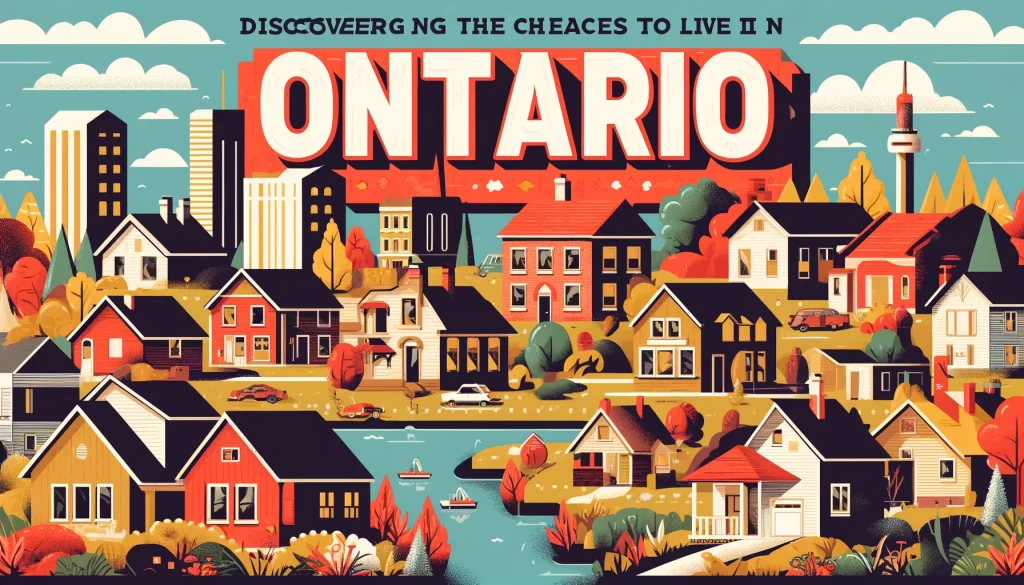
Ontario, Canada’s most populous province, is known for its vibrant cities, natural beauty, and significant economic opportunities. However, with this desirability comes a high cost of living, particularly in terms of real estate. In this comprehensive guide, we’ll explore the cheapest places to live in Ontario, delve into the mortgage landscape, offer practical advice for living affordably, and provide additional relevant information to help you make informed decisions when it comes to finding affordable living in Ontario.
Introduction to Ontario’s Real Estate Landscape
Overview of Ontario’s housing market
Ontario’s housing market has seen considerable fluctuations, with prices in major cities like Toronto and Ottawa reaching record highs. This surge has made it challenging for many to find affordable housing, highlighting the need to look beyond these urban centers for more cost-effective living options.
Importance of finding affordable living spaces
In a province where the cost of living continues to rise, finding affordable living spaces has become crucial for financial stability and quality of life. It’s not just about having a roof over your head but ensuring that you can live comfortably without financial strain.
Criteria for Defining Affordable Living
Cost of living considerations
When defining affordable living, one must consider various expenses, including utilities, groceries, transportation, and healthcare. These factors contribute to the overall cost of living, affecting how affordable a place is.
Comparing urban vs. rural living expenses
Urban areas tend to have higher living costs due to increased demand and amenities. In contrast, rural areas offer lower costs but may lack certain conveniences. This comparison is vital when considering where to live in Ontario.
Top Affordable Places to Live in Ontario
Cities and towns with the lowest cost of living
- Thunder Bay: Known for its low housing costs and beautiful natural surroundings.
- Sudbury: Offers affordable living with ample employment opportunities in the mining sector.
- Windsor: Has some of the most affordable housing in Ontario, close to the US border.
- Kingston: Combines affordable living with rich history and vibrant culture.
Advantages and disadvantages of each location
- Thunder Bay: Pros: Natural beauty, low cost of living. Cons: Remote location, limited job opportunities.
- Sudbury: Pros: Strong job market, affordable housing. Cons: Harsh winters, distance from major cities.
- Windsor: Pros: Extremely affordable, close to the US. Cons: Economic dependence on the auto industry.
- Kingston: Pros: Cultural amenities, historical significance. Cons: Higher cost compared to other towns listed.
Additional Affordable Places to Consider
While Thunder Bay, Sudbury, Windsor, and Kingston are known for their affordability, there are other cities and towns in Ontario that offer relatively lower living costs. These include:
- Timmins: A mining town with affordable housing options and a low unemployment rate.
- Sault Ste. Marie: Known for its natural beauty and affordable real estate market.
- Peterborough: Offers a lower cost of living compared to larger cities in Ontario, with a thriving arts and culture scene.
- Belleville: Located near the Bay of Quinte, Belleville offers affordable housing and a strong sense of community.
Factors Influencing Housing Prices in Ontario
Economic indicators affecting real estate prices
Factors like employment rates, interest rates, and economic growth play significant roles in determining real estate prices. A strong economy often leads to higher housing prices due to increased demand.
Impact of location on housing affordability
Proximity to major cities, amenities, and transportation networks can significantly affect housing affordability. Rural and less developed areas tend to offer more affordable options.
Additional Factors to Consider
In addition to economic indicators and location, there are other factors that can influence housing prices in Ontario. These include:
- Population growth: Areas experiencing rapid population growth often see increased demand for housing, leading to higher prices.
- Infrastructure development: The presence of new infrastructure projects, such as highways or public transportation, can impact housing prices in the surrounding areas.
- Government policies: Changes in government policies, such as regulations on foreign buyers or incentives for affordable housing, can also influence the real estate market.
Navigating the Ontario Mortgage Landscape
Basics of getting a mortgage in Ontario
Obtaining a mortgage in Ontario involves several steps, including pre-approval, home inspection, and closing the deal. Understanding the basics can simplify the home-buying process.
Fixed-rate vs. variable-rate mortgages
Fixed-rate mortgages offer stability with consistent payments throughout the term. -Variable-rate mortgages** can fluctuate, potentially offering lower rates but the risk of increase.
Additional Mortgage Options to Consider
While fixed-rate and variable-rate mortgages are the most common options, there are other mortgage options available in Ontario. These include:
- Open mortgages: Allows borrowers to make additional payments or pay off the mortgage in full without penalties.
- Closed mortgages: lower interest rates but have restrictions on prepayment options.
- Convertible mortgages: Allows borrowers to switch from a variable-rate to a fixed-rate mortgage during the term.
How to Qualify for a Mortgage in Ontario
Credit score requirements
A good credit score is essential for mortgage approval, typically above 680. This score demonstrates to lenders that you’re a responsible borrower.
Income and employment verification process
Lenders will verify your income and employment to ensure you have the means to make mortgage payments. This process involves submitting various documents, including paystubs and tax returns.
Additional Qualification Factors
In addition to credit score, income, and employment verification, there are other factors that lenders consider when qualifying borrowers for a mortgage in Ontario. These include:
- Debt-to-income ratio: Lenders assess your debt-to-income ratio to determine if you can comfortably manage mortgage payments alongside other financial obligations.
- Down payment: The size of your down payment can impact your eligibility for certain mortgage products and affect the interest rate you receive.
- Property appraisal: Lenders will require a property appraisal to ensure that the value of the property aligns with the mortgage amount.
Tips for First-Time Home Buyers in Ontario
Programs and incentives for first-time buyers
Several programs can help first-time buyers, such as the-Time Home Buyer Incentive and the Home Buyers’ Plan, which allow individuals to use their RRSPs towards their down payment.
Saving for a down payment and other costs
It’s crucial to save for a down payment, typically 5-20% of the home’s purchase price, and to budget for additional costs closing fees and home inspections.
Additional Tips for First-Time Home Buyers
- Work with a real estate agent: A knowledgeable real estate agent can guide you through the home-buying process, help you navigate negotiations, and provide valuable insights into the local market.
- Get pre-approved: Getting pre-approved for a mortgage can give you a better understanding of your budget and increase your chances of securing your desired property.
Living Affordably in Ontario: Practical Advice
Calculating monthly expenses beyond the mortgage
Homeownership involves various expenses beyond the mortgage, including property taxes, utilities, and maintenance. Budgeting for these expenses is essential for financial stability.
Importance of an emergency fund
Having an emergency fund is crucial for homeowners to cover unexpected repairs or job loss. It provides a financial safety net that can prevent debt accumulation.
Additional Budgeting Tips
- Track your expenses: Keeping a record of your expenses can help you identify areas where you can cut costs and save money.
- Review your budget regularly: Regularly reviewing and adjusting your budget ensures that you stay on track and can adapt to any changes in your financial situation.
Lifestyle Adjustments for Affordable Living
Minimizing living costs without sacrificing quality of life
Simple lifestyle adjustments, like reducing utility usage and embracing DIY projects, can significantly reduce living costs without impacting quality of life.
Community resources for new homeowners
Many communities offer resources to help homeowners, such as home improvement workshops and energy-saving programs. Taking advantage of these resources can lead to savings and a stronger sense of community.
Additional Tips for Affordable Living
- Consider shared living arrangements: Sharing living expenses with roommates or family members can significantly reduce housing costs.
- Explore alternative transportation: Opting for public transportation, cycling, or carpooling can help save on transportation expenses.
Future Outlook of Ontario’s Housing Market
Predictions for housing affordability in Ontario
While it’s difficult to predict the future accurately, trends suggest that housing affordability may continue to be a challenge, emphasizing the importance of finding cost-effective living solutions.
How government policies might influence the market
Government policies, such as interest rate adjustments and housing regulations, can significantly influence the housing market. Staying informed about these policies is crucial for prospective and current homeowners.
Additional Factors Affecting the Housing Market
- Population growth: The influx of new residents can increase demand for housing, potentially driving up prices in certain areas.
- Infrastructure development: Investments in infrastructure, such as new transportation networks or amenities, can impact housing prices in the surrounding areas.
Conclusion
Finding affordable living spaces and navigating the mortgage landscape in Ontario requires thorough research and planning. By considering the cheapest places to live, understanding mortgage basics, implementing practical advice for affordable living, and considering additional relevant information, individuals can achieve homeownership in Ontario without compromising their financial well-being.
FAQs
Q What are the cheapest to live in Ontario?
A: Some of the cheapest to live in Ontario include cities and towns such Windsor, Thunder Bay Sudbury, and Tim. These locations offer lower housing costs and a cost of living compared to larger urban centers like Toronto or Ottawa.
Q: What influence housing prices in Ontario?
A: Several factors influence housing prices in Ontario, including economic indicators such as interest rates, employment rates, and population growth. Additionally, the location of the property, proximity to amenities, and demand for housing in a particular area can also impact housing prices.
Q: How can I qualify for a mortgage in Ontario?
A: To qualify for a mortgage in Ontario, lenders typically consider factors such as your credit score, income level, and employment history. A good credit score, stable income, and a low debt-to-income ratio can increase your chances of qualifying for a mortgage.
Q: What tips do you have for first-time home buyers in Ontario?
A: For first-time home buyers in Ontario, it’s important to research and take advantage of programs and incentives specifically designed for them. These programs can include the First-Time Home Buyer Incentive, the Home Buyers’ Plan, and various provincial programs. Additionally, saving for a down payment and other costs associated with homeownership is crucial.
Q: How can I live affordably in Ontario?
A: Living affordably in Ontario requires careful budgeting and making lifestyle adjustments. It’s important to calculate and consider all monthly expenses beyond the mortgage, such as utilities, property taxes, and maintenance costs. Minimizing living costs without sacrificing quality of life can be achieved by exploring cost-saving measures, such as energy-efficient upgrades and utilizing community resources available to new homeowners.
Q: What is the future outlook of Ontario’s housing market?
A: The future outlook of Ontario’s housing market is influenced by various factors, including government policies, economic conditions, and population trends. While it’s challenging to predict with certainty, experts suggest that housing affordability may continue to be a concern, especially in highly sought-after urban areas. Government policies aimed at increasing housing supply and addressing affordability issues may play a significant role in shaping the market’s future.
